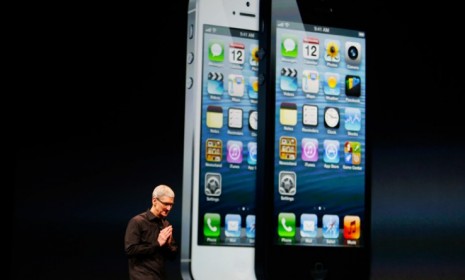Why Apple's events matter
Apple, more than any other entity, has shown the world how technology and the hardware and software at its core can interact with and enrich our lives


A free daily email with the biggest news stories of the day – and the best features from TheWeek.com
You are now subscribed
Your newsletter sign-up was successful
Didja buy your iPhone 5 yet?
Whenever Apple launches a new product, people who are not obsessive Apple geeks usually react in one of three ways. First there are folks (like me) who are interested to find out what Apple has done. I respect their culture of secrecy, although it seems to have failed them this time around, as there were no surprises when the iPhone 5 was announced.
Second, there are people who don't follow technology, use it as little as possible, and genuinely don't care. The third category will be people who aggressively, loudly, and conspicuously don't care.
The Week
Escape your echo chamber. Get the facts behind the news, plus analysis from multiple perspectives.

Sign up for The Week's Free Newsletters
From our morning news briefing to a weekly Good News Newsletter, get the best of The Week delivered directly to your inbox.
From our morning news briefing to a weekly Good News Newsletter, get the best of The Week delivered directly to your inbox.
They'll let you know how much they don't care on Facebook and Twitter and will say that people who care are Apple zealots ("fanboys," to use the nomenclature), fashion victims driven by vanity to always have the latest and greatest, or idiots who are easily hypnotized by Apple's insidious marketing machine. They'll say that everything the iPhone introduced earlier this week can already be found on an Android phone.
I totally understand why some people genuinely don't care about this stuff — people have stuff to do, and I'm sure even the vast majority of Apple users don't actually block off two hours to watch the event, live or otherwise.
But whether you care or not, Apple launch events matter. And if you hate Apple and would never buy any of their products, they actually matter to you even more.
First, there was their (at the time) radical idea that ordinary people would want attractively-designed "personal computers" with an easy-to-use interface. Then there was the iPod and the iTunes store, which brought entertainment into the digital age. The iPhone was one of Apple's cleverest tricks — they claimed the iPhone was a mobile phone when it was actually a pocket-sized, internet-enabled mini computer with an amazingly intuitive interface, where making calls was simply one of many apps. Then, with the iPad, Apple has shown that the future of computers may not be computers at all.
A free daily email with the biggest news stories of the day – and the best features from TheWeek.com
While one can argue whether Apple came up with these ideas first, few can dispute that they've been the best at executing them. And in doing so, Apple, more than any other entity, has shown the world how technology and the hardware and software at its core can interact with and enrich our lives.
And what if you hate Apple? It doesn't matter, since if you use a non-Apple computer, smartphone, or tablet, their hardware or their software are largely imitations of Apple products or are relics. Use a non-Apple laptop or a desktop computer? It's probably running Microsoft Windows, which is mostly a rip-off of Apple's Mac OS. Use a touchscreen smartphone made after 2007 or a tablet? They wouldn't look and act the way they do if it weren't for the iPhone and the iPad, and they're probably running Android, which is a rip-off of Apple's iOS.
Apple's design and sensibility are so vital to how we use technology today that not copying Apple has proven to be a potentially lethal liability. Research in Motion, maker of the once industry-leading BlackBerry, was slow to adapt to the smartphone revolution the iPhone created and is essentially dead, while Palm has been long buried.
Apple's announcements have a throat-clearing quality. Steve Jobs (and maybe Tim Cook) was a Walter Cronkite figure who was capable of leading public opinion; whenever he spoke, whenever he did his presentations, everyone else listened and adapted. So many other companies make their decisions about product announcements based not on what Apple might actually offer but when they might offer it. This suggests to me that, even in this marketplace, Apple's actual power exceeds its marketplace share. The events have helped.
Marc Ambinder is TheWeek.com's editor-at-large. He is the author, with D.B. Grady, of The Command and Deep State: Inside the Government Secrecy Industry. Marc is also a contributing editor for The Atlantic and GQ. Formerly, he served as White House correspondent for National Journal, chief political consultant for CBS News, and politics editor at The Atlantic. Marc is a 2001 graduate of Harvard. He is married to Michael Park, a corporate strategy consultant, and lives in Los Angeles.
